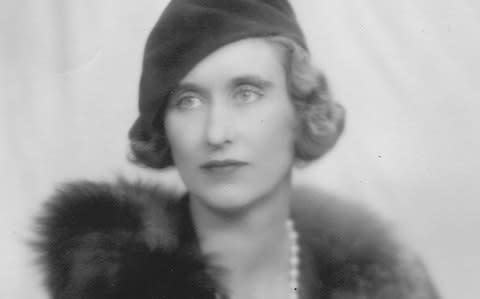'Everyone is convinced Hitler will destroy England': the secret diary of a British aristocrat in Italy

Published 70 years ago, War in Val d’Orcia, British-born aristocrat Iris Origo’s account of life in Italy during the Second World War, is one of the most cherished war diaries in history. Until now, however, her earlier diary – dating from March 1939 to July 1940 and charting Italy’s descent into war – remained private.
A gripping insight into the period leading up to the summer of 1940, when Mussolini aligned with Hitler against the Allies, it is told from the unusual perspective of a British woman whose adopted country was becoming an enemy of her native one.
The daughter of William Bayard Cutting (of a wealthy New York family) and Lady Sybil Cuffe (whose social circle included Somerset Maugham and Henry James), Origo moved to Italy when she was nine and remained there, marrying Antonio Origo, the illegitimate son of an Italian marquis, in 1924.
Last night Hitler’s speech. It is received here with almost universal approval
She devoted much of her life to renovating La Foce, the dilapidated Tuscan estate that she and her husband bought. It was there that, during the war, they risked execution by harbouring British soldiers.
In the months preceeding this, Origo, then aged 37, an anti-fascist, kept this diary as a record of what she learnt from gossip, hearsay, newspaper reports and the foreign radio broadcasts she tuned into, in an attempt to cut through the propaganda and piece together the true global picture.
‘It is difficult to convey the cumulative impact of these voices as we sat alone in our isolated country house day after day,’ she later wrote, ‘and the increasing sense they brought of inevitable, imminent catastrophe, of the Juggernaut approach of war.’
9 April, 1940
It is clear that something is brewing, and as I wake up this morning, I find a note on my breakfast tray. ‘Germany has invaded Denmark at 3 o’clock this morning. German troops have landed at Oslo. Norway is at war.’
18 April
Two very odd days in Rome. We arrive there on a lovely spring morning. In the Villa Borghese Judas trees and wisteria are glowing under the great pines. Outwardly Rome has never seemed more beautiful, more prosperous or more gay. But as we drive up to the Excelsior, we get a first slight shock: two German soldiers in uniform – tall, gawky, wooden-faced peasant boys – are standing on the steps.
The passers-by stop, stare, nudge each other: ‘They’re from the German military mission’ – ‘Yes, this time they’ve come without bombs!’ – ‘Nonsense, they’re only the grooms of the Horse-show officers.’ An underlying current of uneasiness, of discontent, is everywhere. At the hairdresser’s… in the cubicle next to mine a Swedish diplomat’s wife – oblivious of the fact that voices raised under the dryer carry far – is unbosoming herself to the manicurist.
‘We’re dining tonight at the German Embassy. And perhaps tomorrow I’ll wake up to the news that those swine have invaded my country!’ At a large dinner party that night at the American Embassy similar conversations are going on in undertones.

‘The only hope is the Vatican.’
‘Nonsense, the Pope can’t do anything. But the King. The Army would still back him up, if only he’d be firm.’ ‘He’s too old; he’s under the Duce’s thumb.’ Meanwhile, in the intervals of the anxious, inconclusive chatter, Walt Disney’s new film is shown: Pinocchio. The audience simulates an unconvincing childishness.
‘Too enchanting! Don’t you adore old Geppetto? And Jiminy Cricket!’ – ‘My congratulations, Mr l’Ambassadeur! A wonderful piece of American propaganda!’ This section of Roman society – the ‘smart’, cosmopolitan world – is mostly anti-German, with the exception, it is rumoured, of a few well-paid informers of the secret police, the OVRA, mostly women.
But its reasons for being pro-English – a taste for English country life, English tweeds, guns and riding-boots – are hardly such as to cut much ice with the Duce. Indeed these people, whom he despises, rouse him to his most violent outbursts of rage. For one thing is certain. Whatever his sympathies may have been in the past, they are now wholly pro-German.
21 April
Popular rumour had fixed upon today – the anniversary of the foundation of Rome – as a decisive date. Indeed an old Tuscan peasant woman, credited with the gift of prophecy, had actually committed herself to three dates: a) a snowfall on April 10th b) her own death on April 16th c) Italy’s entry into the war on the 21st The first two came true, but the third date has brought nothing more exciting than a mild statement by Mussolini that ‘Work and Arms’ must be the slogan of the Italian people.
10 May
It has come. Belgium and Holland are invaded this morning. We hear the news by telephone, from the station-master at Chiusi [in Siena], our electric light having broken down so that we have no radio. All the day we wait for more news.
14 May
In Florence the atmosphere is very tense. In town, I find the streets plastered with posters: ‘England’s collapse’; ‘Woe to those who accept England’s help’, ‘Not Hitler, but Churchill, has missed the bus’; etc.
The French and English Consulates are both guarded by troops, and as I enter the French Consulate, a procession of students – most of them schoolboys – appear, singing and waving banners inscribed ‘Down with British piracy’.
The crowd, however, watches them with an ironic eye. ‘First they organise a students’ demonstration,’ says a shopkeeper, as we stand in his window looking on, ‘then they send troops to “protect” the Consulate from the students.’
28–29 May
Woken by the telephone. It is Mary Senni [Iris’s American friend] ringing to tell me of the capitulation of Belgium. Feeling anxious about my mother’s future position here, I try to get some information from the British and American Embassies.
By the British, I am told that a veiled warning has been given by the Italians to get British citizens away; by the American, that they received a most definite order from Washington to pack off all Americans on the Manhattan on Saturday. At the Swiss legation I succeed in getting a special visa for both my mother and my stepfather, as invalids, to go to a clinic at Valmont [near Montreux]; an ambulance carriage is granted by the Red Cross for next Tuesday.
7 June
The first outward signs of war reach our valley. In the early morning 35 bombers heading south fly over us, and in the afternoon about 50 military lorries, bound for the aviation camp at Castiglione del Lago, drive up the road from Rome. The peasants look up as they hear the rumble, say resignedly ‘Ci siamo’ [‘This is it’] – and get back, while they can, to their hay.
10 June
We wake to the news that the Germans are within 40 miles of Paris. At midday a telephone message from the Fascio of Chianciano orders us to summon all our peasants to the Dopolavoro [the men’s club], to hear the Duce speak that afternoon.
They all gather in the front garden: Antonio the fattore [farm manager] and the keepers, the school teachers, the household, and about 80 peasants and workmen. ‘Attenzione!’ brays the loudspeaker. The men rise to their feet, shuffle closer to the radio. We hear the shouts of the crowd in Piazza Venezia, the cheering and the bands, and then (presumably as the scene is relayed to a German station) a harsh, guttural voice speaking German.

Then deafening cheers from the radio, presumably as the Duce appears on the balcony – and then his unmistakable voice: ‘Combattenti di terra, di mare, dell’aria [combatants on land, sea and in the air], blackshirts of the revolution and of the legions, men and women of Italy, of the Empire, and of Albania, listen.
An hour marked by destiny is crossing the sky of our country: the hour of an irrevocable decision. The Italian declaration of war has already been handed to the Ambassadors of Great Britain and France.’ I look again at the listening faces. They wear the blank, closed look that is the peasant’s defence. Impossible to tell how much they have taken in or what they feel – except that it is not enthusiasm.
19 June
The merciless fighting continues. Strasbourg and Dijon are occupied in the east, Brest and St Malo in the west, and men continue to be killed – for what? As, hour after hour, we turn on the radio in hope of news of an armistice, we hardly pay any attention to the news that Russia is occupying Lithuania, Estonia and Latvia. Japan is menacing Indo China. Banditry spreads fast.
3 July
My first air raid last night [in Rome]. The sirens began just after midnight; I was still awake and was joined by William Phillips [the American ambassador and Origo’s godfather]. We sat talking pleasantly in the dark for about one hour, heard one distant burst of fire and then the all-clear signal. Altogether a singularly unalarming experience, except apparently to the lions in the zoo, who went on roaring all night.
6 July
This is a strange period of waiting. The Roman summer, with the city half empty and the black-out at night, is more beautiful than I have ever seen it. In the evenings we dine out under the ilex trees of Villa Taverna, shimmering with fireflies.
15 July
I have seen today a Swedish friend who has just been in prison in Florence for a fortnight for ‘imprudent speaking’. She has lived and worked in Florence as a Swedish masseuse for 30 years.
Undoubtedly she has not been prudent in her frank expression of anti-German feeling, although the actual remark which caused her arrest was nothing more than the expression of a hope that her country would not soon suffer the same fate as Norway.

She was fetched by the police at 10pm, allowed to take nothing with her but the clothes on her back and 90 lire in her purse, and taken to the common women’s prison. Here she spent three nights in a tiny cell… and then was moved to a large dormitory which she shared with 47 other political prisoners – mostly English, a few French and one Swiss girl.
The beds were infested by bugs, the lavatories approximately clean. The food, unless eked out by what the prisoners could buy for themselves, was very poor and scanty. After a fortnight most of the French and English were let out, and our Swedish friend at the same time, with the proviso that she must leave the country immediately.
20 July
Last night Hitler’s speech. It is received here with almost universal approval; even those people who are not admirers of Nazism consider it a genuine effort towards peace and a last chance for England to save herself from destruction. That this destruction will be inevitable and will be swift, if Hitler does attempt it, no one doubts.
23 July
Last night Lord Halifax’s speech, removing any last doubt as to how England has received Hitler’s proposals. We sat in the American Embassy listening to it gloomily on the American radio: two Italians, one Belgian, three Americans. At the end: ‘Do you think the door to peace is still open?’ asked one of the Italians. ‘Shut and barred,’ said the other.
Extracted and abridged from A Chill in the Air by Iris Origo (Pushkin Press, £14.99), which is out on 26 October. To pre-order your copy for £12.99 plus p&p, call 0844-871 1514 or visit books.telegraph.co.uk


